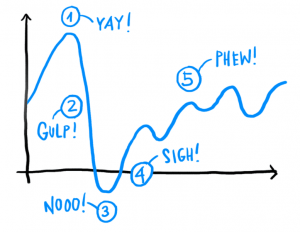I’ve had a brief look ahead into the modules for ETL401 and am looking forward to the near future as I can see that we will be starting to learn about Guided Inquiry. I’m actually quite lucky, as I’ve been told that my school will be implementing a policy that will see every faculty delivering one Guided Inquiry Design (GID) unit for a stage 4 class at some point during the year. That means that, fortuitously, what I’m learning in my modules will be running directly parallel to what I will be working on professionally. Better get a head start!
I should also mention that I’ve been lucky enough to attend some professional learning in guided inquiry, specifically Guided Inquiry Design, in the form of a half-day workshop delivered by Leslie Maniotes – she literally (co)wrote the foundational books on Guided Inquiry (Kuhlthau, Maniotes, Caspari, 2015; 2012) and is lead author of the Guided Inquiry design in Action books (Maniotes, 2017). With this in mind I thought I’d share a few of the notes/insights I received on the day.
- GID is a framework for implementing inquiry learning in schools. It has been developed through extensive research based on a constructivist approach to learning (think Piaget, Vygotsky etc.)
- GID can be considered “a way of learning”
- GID encompasses:
- Curiosity
- Research
- Choice/freedom/personalization
- “Filling the gaps” of knowledge
- Personalised learning/ Passionate Learning/ Discovery & finding passions
- Asking questions
- Wondering
- Natural process of learning
- Reflecting on learning leads to further learning
- “Inquiry is asking questions and learning from information”
- There are eight phases of the GID process. These correspond to different stages someone goes through when conducting research – note the diagram that was referred to below (the Information Search Process, or ISP was mentioned – I don’t think this is exactly the same thing but was shown to provide a sense of the process an individual researcher may go through. I’ll have to look into this more closely I think:
- “Uncertainty is the beginning of learning” – To me this was one of the best nuggets of information I took away from the day. I thought it was insightful as I have seen this in my own students when starting a new unit of work/topic/research assignment. To me this is quite powerful and enlightening. It makes me think “hey, it’s ok if I’m feeling anxiety. It’s ok if I’m feeling hesitant about this new topic. It’s ok if I doubt myself and my abilities, this is just the start of my learning”. It makes me think more about my students and their learning process and gives me something I can use as motivation for them to feel ok about their possible anxieties towards learning as well.
- GID works when it is conducted in a “learning team” – Librarian/TL/Classroom Teacher (+ more…learning support teacher; other subject teacher (cross-curricular units perhaps? / external experts invited to contribute area specific knowledge)
- “Interdisciplinary possibilities” – There are opportunities to develop cross-curricular units of work with the GID process
- Using Inquiry journals throughout the GID process is useful in tracking inquiry questions that arise during the research process
Leslie was great in answering any questions and showing us some examples of GID in action and talked through the process of working through each phase – Open, Immerse, Explore, Identify, Gather, Create, Share, and Evaluate. I’m looking forward to learning more about GID and working with my colleagues to design and deliver a GID unit. Better get to work!
References
- Kuhlthau, C, Maniotes, L. K, Caspari, A. (2012). Guided Inquiry Design: A Framework for Inquiry in Your School. Santa Barbara: CA: Libraries Unlimited.
- Kuhlthau, C, Maniotes, L. K, Caspari, A. (2015). Guided Inquiry: Learning in the 21st Century. (2nd ed.). Santa Barbara: CA: Libraries Unlimited.
- Maniotes, L. K. (2017). Guided inquiry design in action: High school. Santa Barbara, CA: Libraries Unlimited
- Maniotes, L. K., Harrington, L., Lambusta, P., & Kuhlthau, C. C. (2016). Guided inquiry design in action: Middle school. Santa Barbara, CA: Libraries Unlimited


Leave a Reply